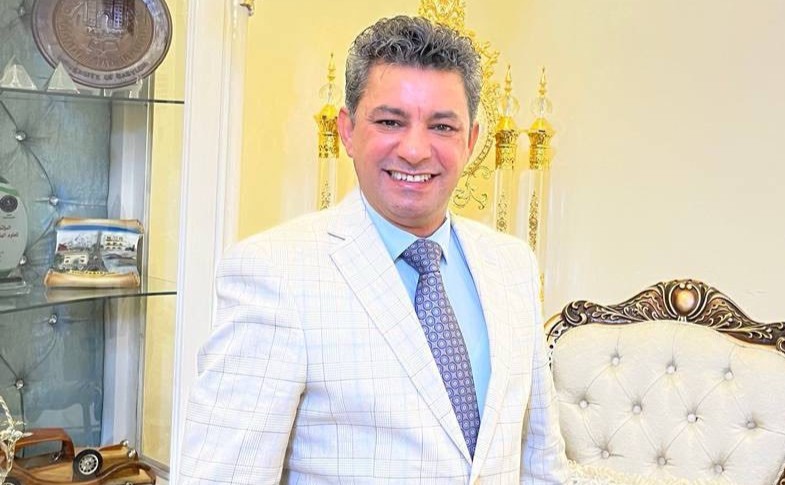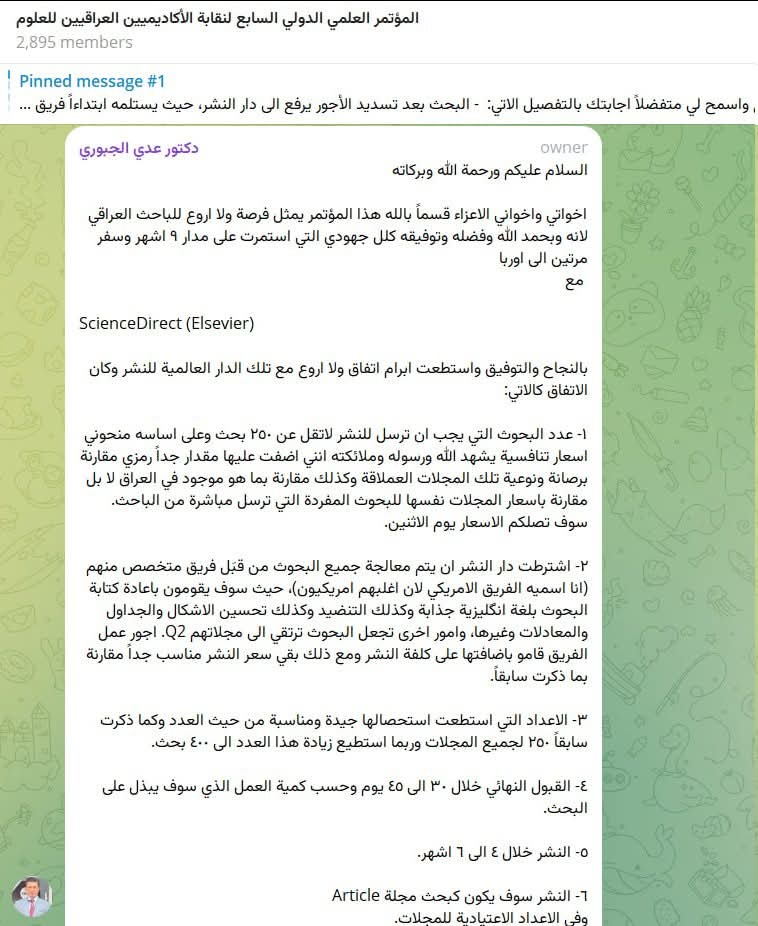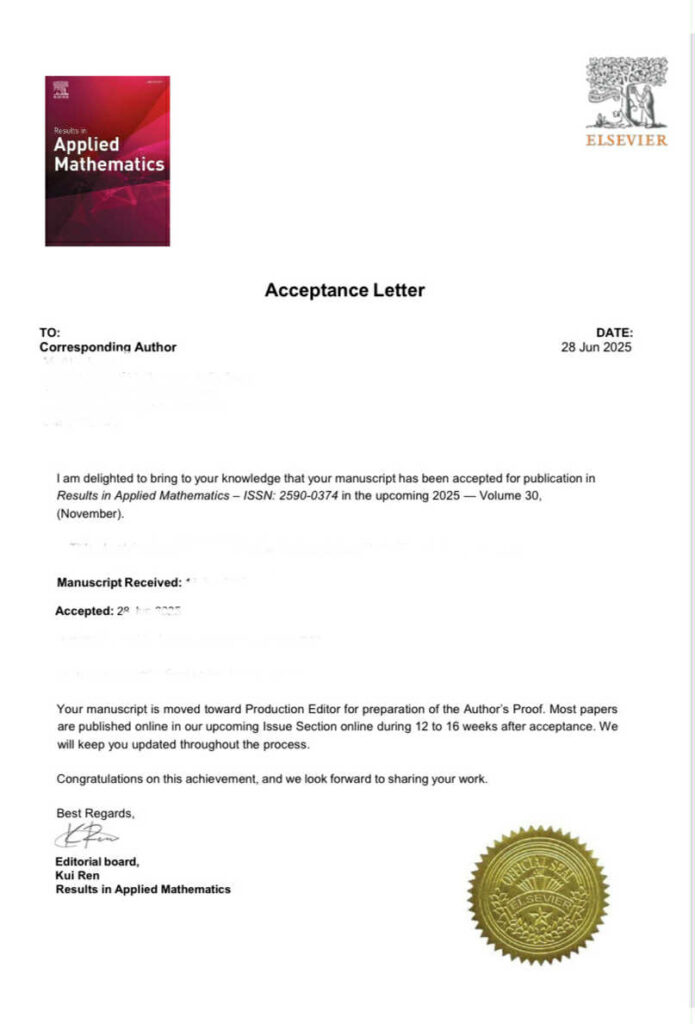
A professor of physics in Iraq was permanently dismissed last week after a government investigation found he orchestrated a massive fraudulent publishing scheme involving hundreds of thousands of dollars paid into his bank account by unwitting researchers, documents obtained by Retraction Watch show.
The scam included a deal between a prominent association of Iraqi academics and a predatory publisher, as well as the creation of a fake journal website and bogus acceptance letters purporting to be from reputed journals.
According to a ministerial order dated September 9 and obtained by Retraction Watch, the physicist, Oday A. Al-Owaedi, who also goes by several other names, defrauded “researchers by collecting money from them under the pretext of publishing their papers in reputable international journals as promised, while in fact falsifying and forging publication in fake websites.”
The document also stated Al-Owaedi falsified “the scientific content of research papers, knowingly, by inserting his name and his scientific works as references in these allegedly published papers.”
An Iraqi scholar close to the matter told us “hundreds” of budding researchers had been caught in the scam. That has put their careers at risk, because master’s and Ph.D. students in Iraq are required to publish papers in indexed journals before they can obtain their degrees, said the source, who spoke on condition of anonymity for fear of reprisal.
“Many graduate students and researchers relied on these conference acceptances for thesis defenses, academic promotion, publication requirements, or graduation,” the source added. “Now, they face academic uncertainty or setbacks due to decisions beyond their control.”
We contacted Iraq’s Ministry of Higher Education and Scientific Research to confirm Al-Owaedi’s termination, which has not been officially announced, and ask if the ministry will take steps to help the victims. We have not heard back. The order permanently removes Al-Owaedi from his position at the University of Babylon in Hilla, a public institution, adding that he committed “acts that render his continuation in state service harmful to the public interest.”
Neither Al-Owaedi nor his former employer responded to requests for comment. But on September 17, the day after we emailed him about the evidence we had obtained, Al-Owaedi announced his dismissal on Facebook (in Arabic) and said he was “innocent of the charges” against him. Al-Owaedi is also a politician and is running in Iraq’s parliamentary election in November.
Al-Owaedi’s publishing scheme centered on a conference that was organized by a prominent association of Iraqi academics and was slated to take place in Baghdad this month. According to its website, the 7th International Conference of the Iraqi Academics Syndicate for Sciences (ICIASS-2025) offered participants a chance to publish their research in AIP Conference Proceedings or one of several “highly respected and peer-reviewed journals from renowned Dutch publishing house Elsevier.” (In correspondence we obtained, AIP Publishing denied having “an agreement in place to publish the proceedings of this conference.”)

In messages posted to the conference’s now-deleted Telegram group, Al-Owaedi, who chaired the organizing committee for the event, claimed he had made a deal with Elsevier to publish hundreds of papers at discounted prices.
Authors were required to pay “publication fees” after receiving a preliminary acceptance notice from the conference, but before publication, Al-Owaedi explained. These fees varied by journal, but typically amounted to US$650 – or some $100 more than Iraq’s average monthly salary – according to a list the conference supplied of more than two dozen journals from Elsevier, AIP and another publisher.
After payment, the works would be sent to “the publishing house,” which would edit it and submit it to one of the journals on the list, Al-Owaedi wrote.
In reality, the ”publishing house” referred to Acadia Pulse, which in May signed an agreement with Al-Owaedi to assist his organization in publishing a “total of 400 academic papers in peer-reviewed Scopus Q2 indexed journals.”
Acadia Pulse describes itself as a New York-based “international consultancy offering students, researchers, and corporations the opportunity to publish in PubMed and Scopus indexed journals.” But no records of a business called Acadia Pulse exist in the U.S. Securities and Exchange Commission’s EDGAR company database. Meanwhile, the operation’s website has several hallmarks of a full-fledged paper mill, such as promising ”guaranteed publications in our flagship journals.”
One of these “flagship” publications is the International Journal of Scientific Studies and Qualitative Research, which lists as its editor-in-chief Gunnar Möller. A physicist at the University of Kent in the UK, Möller told us he had never heard of the journal.
The company did not respond to our requests for comment.
According to emails and bank receipts we obtained, authors at the conference were required to pay the publication fees directly into Al-Owaedi’s personal bank account. In at least one case, the required payment – 950,000 Iraqi dinars, or about US$725 – exceeded the “publishing cost” provided in the journal list by more than US$50.
On July 8, Al-Owaedi announced on Facebook that the first research from the conference had been published in Elsevier’s Journal of Vocational Behavior. He included what he described as a link to the paper: https://link-doi.org/11.1230/j.jvb.2025.178213. When the link was still functional (we archived it here), it sent readers to a near-perfect sham version of the journal’s website. The site displayed a complete article, titled “Holland’s Characteristics of personality Traits and Their Influence in Impression Management” and written by two real Iraqi scholars.
But the Digital Object Identifier link was forged – real DOI prefixes always start with “10,” not “11” – and the paper had never been published. We reached out to the two authors, but one told us he was sick and the other never replied.

Similarly, some authors began receiving purported acceptance letters from the journals, as well as what appeared to be login information allowing them to access Elsevier’s Editorial Manager system to track their submissions, according to videos we have seen.
But Elsevier told us the letters had not been issued by their publications, adding, “The matter is still under investigation, but so far, we have no evidence that Editorial Manager was compromised.”
The ministerial order dismissing Al-Owaedi states he handed over the money received from the researchers to his wife, “without authorization from the [Iraqi Academics Syndicate] and without disclosure thereof.”
The Iraqi Academics Syndicate has not responded to our requests for comment.
In his September 17 Facebook posts, Al-Owaedi stated the money he received had “been transferred by the conference to the publishing company.” As proof, he attached pictures of two purported bank transaction slips listing amounts of $54,000 and $150,000, respectively.
Correspondence from Acadia Pulse addressed to “Iraqi Universities” suggests the forgery did not go unnoticed, and the company attempted damage control through obfuscation.
In a section titled “Reasons Why Journals Declare Acceptance Letters Fake and Papers Non-Existent,” a letter signed by a “Henry Davis” stated, “Journals have strict terms and conditions that authors must follow. One of these is that authors must not contact the journal directly before publication. If an author violates this condition, the journal may deny any connection to the manuscript because such contact undermines the confidentiality of the editorial process and affects their business model.”
Another message addressed questions about the strange DOI prefix of the forged conference publication. “We would like to clarify that the assignment of DOI prefixes is entirely determined by the respective journal or publisher,” the letter stated. ”Each publisher is registered with CrossRef (or another DOI registration agency) and may receive a different prefix based on their allocation.”
The Iraqi scholar who spoke on condition of anonymity said some students had not been awarded their degrees because they presented the fake journal acceptance letters at their thesis defense.
“There have been attempts to blame students and researchers for making payments or not recognizing the fraud,” the source told us. “This is unfair. The participants received what appeared to be formal, official conference acceptance letters. They were acting in good faith, based on institutional trust, and should not be penalized for the failure of oversight bodies.”
The source also criticized the government for making Al-Owaedi chair of yet another conference organizing committee two weeks after the investigation against him began, and for keeping the probe under wraps while conference participants continued submitting papers and paying publication fees to the physicist.
“This delay directly enabled the harm done to researchers and students,” the source said.
Like Retraction Watch? You can make a tax-deductible contribution to support our work, follow us on X or Bluesky, like us on Facebook, follow us on LinkedIn, add us to your RSS reader, or subscribe to our daily digest. If you find a retraction that’s not in our database, you can let us know here. For comments or feedback, email us at [email protected].
I’m not sure this type of company would be in the Edgar database. That generally is for publicly traded entities, investment funds, and a few other categories. The Secretary of State’s site is usually where you’d find a private business registered… in this case, I looked it up and did not find it in NY.
The name matches with this business https://ecorp.azcc.gov/BusinessSearch/BusinessInfo?entityNumber=23694993
But very little information is provided.
Thanks. I’m not sure what to make of that. I matched names and cities for the managers of that business to a chiropractor/nurse and a police detective in those respective locations. Might not be the right people, and it’s hard to see how they would be connected… but now I want to know what type of business might have brought those two together 🙂
The Arizona company in the link in the comment above is called “Arcadia Pulse”, not “Acadia Pulse” as the company in our story. A people search on LinkedIn for “Acadia Pulse” yields a “Dr. Catherine Parks” purportedly based in New York (https://www.linkedin.com/in/dr-catherine-parkes-b87755198/) and two profiles in Pakistan.
Profile of this Catherine Parkes is most likely fake. I see a photo that more looks like it’s from a fashion show. The Dr. title suggests a PhD from the Yeshiva University, but I can’t find any publications in Google Scholar that indicates both Catherine Parkes and Yeshiva University.